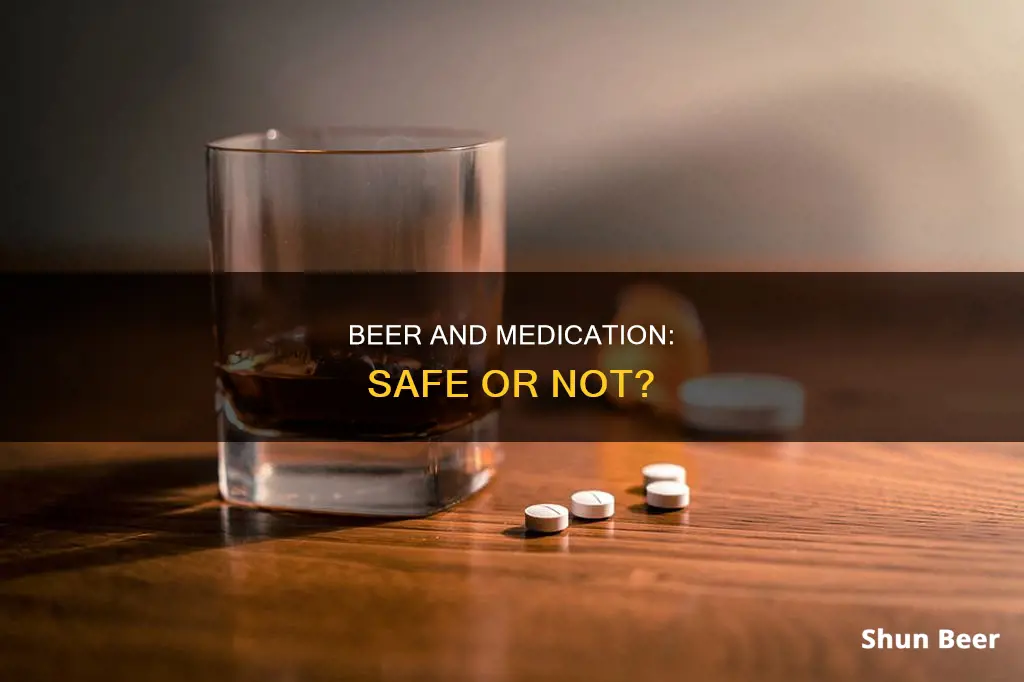
Drinking alcohol while taking medication can be a dangerous combination, and it's important to know how long you should wait after taking medicine before consuming alcohol. Mixing alcohol with medication can cause harmful effects, even if they are not taken at the same time. Alcohol can also cause side effects such as digestive problems, including stomach pain, diarrhea, and ulcers. It's best to consult with a medical professional about how alcohol may interact with your medication.
| Characteristics | Values |
|---|---|
| Alcoholic beer | Likely safe for most adults when used in moderation (two 12-ounce glasses daily). |
| Alcoholic beer | Can cause blackouts, drowsiness, low blood sugar, vomiting, and other serious problems when consumed in higher amounts. |
| Alcoholic beer | Can cause many serious health problems, including dependence, liver problems, and certain types of cancer, when consumed in large amounts over a long period |
| Alcoholic beer | Likely unsafe to drink during pregnancy |
| Alcoholic beer | Likely unsafe to drink while breastfeeding |
| Non-alcoholic beer | Likely safe for most people |
| Antibiotics | Alcohol can increase the chance of developing side effects |
| Antidepressants | N/A |
| Diclofenac | N/A |
What You'll Learn

Antibiotics
Drinking beer while taking antibiotics is generally not recommended due to the potential for harmful interactions and negative effects on the immune system. Alcohol can interfere with the body's ability to absorb some antibiotics, making them less effective. Additionally, both alcohol and antibiotics can cause similar side effects, such as drowsiness, dizziness, and digestive issues, which may be amplified when the two are combined.
It is important to note that different antibiotics react differently with alcohol. For example, penicillins and sulfonamides are not likely to cause side effects when consumed with alcohol, while nitroimidazoles like metronidazole should be avoided due to the risk of toxin buildup, which can cause nausea, headache, dizziness, and vomiting. Fluoroquinolones may also cause side effects when mixed with alcohol, so it is important to discuss this with your doctor.
In most cases, consuming alcohol in moderation while taking the most common antibiotics is unlikely to cause problems. However, it is always best to check with your doctor or pharmacist to understand the potential interactions and risks associated with mixing alcohol and your specific antibiotic.
It is worth noting that alcohol can also be found in some mouthwashes, cold medications, and other products. Therefore, it is important to read labels and be mindful of all sources of alcohol during antibiotic treatment.
Beer and Hydroxyzine: Safe After 18 Hours?
You may want to see also

Antidepressants
Drinking alcohol while taking antidepressants is not recommended. Alcohol can worsen symptoms of depression, making it more difficult to treat. It can also increase the risk of overdose and worsen side effects such as drowsiness or dizziness.
The combination of alcohol and antidepressants can lead to serious health risks and even require emergency medical attention. Alcohol is a depressant, and when mixed with antidepressants, it can intensify the depression that the medication is trying to treat. This can lead to worsened symptoms of depression or lowered inhibitions related to suicidal thoughts and tendencies.
Different types of antidepressants react differently when paired with alcohol. Common effects include impaired motor control, intensified depressive moods and thoughts, and increased risk of overdose. The alcohol interacts with the antidepressants, making them less effective. The depressive effect of alcohol on top of the antidepressants can lead to potentially deadly consequences.
Selective Serotonin Reuptake Inhibitors (SSRIs) are the most commonly prescribed type of antidepressant. Serotonin is one of the "feel-good" chemicals that the brain creates. SSRIs stop the brain from absorbing serotonin at its usual rate, leading to a build-up of the chemical and a more sustained "feel-good" response. Common SSRIs include Prozac, Zoloft, Lexapro, Celexa, Luvox, and Paxil. These types of antidepressants are not compatible with alcohol, especially in large amounts, and can worsen liver damage.
If you are taking antidepressants and drinking alcohol, it is important to discuss your alcohol use with your doctor or another healthcare professional. They can help you address the alcohol use and provide treatment options to support your mental health and reduce the likelihood of increased mental and physical health issues.
Beer Subscriptions: How Do They Work?
You may want to see also

Diclofenac
Drinking alcohol while taking diclofenac is not recommended. Alcohol can irritate the stomach lining, and mixing it with diclofenac may increase the risk of gastrointestinal bleeding and stomach ulcers. This is because both substances can affect the lining of the gastrointestinal tract, increasing the likelihood of ulcers forming in the stomach and intestines.
The risk of adverse effects may be higher for those who take diclofenac for an extended period or consume large amounts of alcohol while taking the medication. Other possible complications include cardiovascular issues, liver damage, cognitive issues, and increased intoxication.
It is always best to consult a medical professional before taking diclofenac or consuming alcohol while on this medication. It is crucial to inform your doctor about all medications, supplements, and health conditions to ensure safe use.
Pregnant Women and Root Beer Float: Is It Safe?
You may want to see also

Aspirin
While drinking a small amount of alcohol while taking aspirin is usually safe, mixing the two substances can lead to adverse side effects.
Increased Risk of Gastrointestinal Bleeding
Increased Risk of Liver Damage
Both aspirin and alcohol put stress on the liver independently. When combined, they can substantially increase the risk of liver damage, which can lead to serious health complications and even death.
Increased Toxicity of Both Substances
When the liver has to process both alcohol and aspirin, it can become overworked, leading to increased toxicity. This means that alcohol enters your bloodstream faster, causing impairment more quickly. It can also lead to problems operating vehicles, an increased risk of overdose, and increased sleepiness, lightheadedness, and difficulty breathing.
Other Side Effects
Mixing aspirin and alcohol can also cause indigestion problems and increase the risk of stomach ulcers. Additionally, alcohol may affect how the body absorbs and metabolizes aspirin, delaying its effects.
It is important to note that anyone with an alcohol use disorder should not take aspirin without first speaking to a healthcare provider.
Golf and Beer: Forest Park Course Drinking Rules
You may want to see also

NSAIDs
Nonsteroidal anti-inflammatory drugs (NSAIDs) are a group of medications commonly used to treat pain, inflammation, and fever. NSAIDs include medications such as ibuprofen (Advil, Motrin), naproxen (Aleve), and aspirin. While NSAIDs can be effective in managing pain and inflammation, it is important to be aware of their potential interaction with alcohol.
Mixing NSAIDs with alcohol can have harmful effects on the body, especially for older adults and individuals with certain health conditions. Here are some of the risks associated with combining NSAIDs and alcohol:
- Increased risk of gastrointestinal (GI) bleeding and stomach ulcers: Both NSAIDs and alcohol can irritate the stomach and digestive tract. When combined, they further increase the risk of ulcers and bleeding in the digestive tract. This risk is higher for individuals who take NSAIDs regularly and consume heavy amounts of alcohol.
- Kidney problems: NSAIDs can affect kidney function by altering the production of certain enzymes in the kidneys. Alcohol consumption adds additional strain on the kidneys, as they are responsible for filtering it out of the body. Combining NSAIDs and alcohol can increase the risk of kidney damage, especially for individuals with existing kidney disease.
- Liver problems: While NSAIDs themselves may not have a significant impact on the liver, combining them with alcohol can potentially raise the risk of liver damage. Alcohol is known to cause liver damage, especially with heavy or chronic consumption. Laboratory studies suggest that NSAIDs may further increase this risk when mixed with alcohol.
- Heart problems: NSAIDs, especially at higher doses, have been linked to an increased risk of heart problems, including heart attacks. Regular or heavy alcohol consumption is also associated with heart-related issues. Combining NSAIDs and alcohol may elevate the risk of heart problems beyond that of either substance alone.
- Increased drowsiness: Both NSAIDs and alcohol can cause drowsiness. When taken together, they may enhance this effect, leading to excessive sleepiness or difficulty functioning normally. This can be particularly dangerous when engaging in activities that require alertness, such as driving or operating machinery.
It is generally recommended to avoid combining NSAIDs and alcohol. If you must consume alcohol while taking NSAIDs, it is advised to limit it to a small amount, such as a single drink. However, even a small amount of alcohol can increase the risk of side effects, especially for individuals with underlying medical conditions. Therefore, it is crucial to consult your healthcare provider before mixing NSAIDs and alcohol to ensure your safety and well-being.
Beer and Fatigue: Is Your Daily Drink Making You Tired?
You may want to see also







